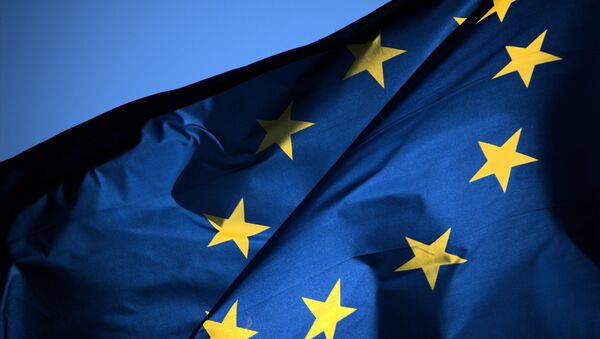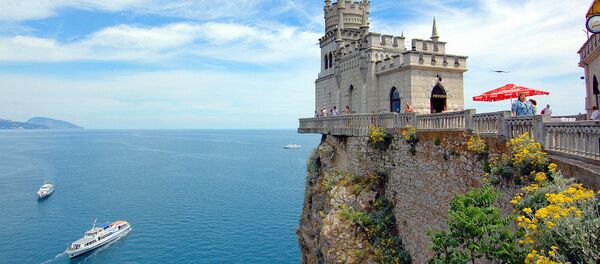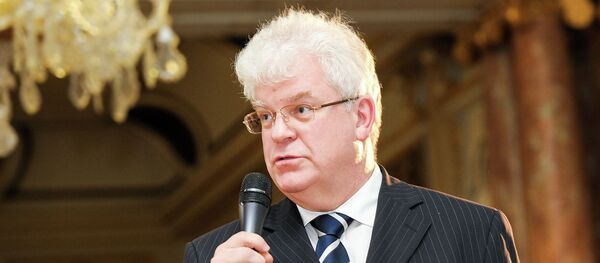March 16 marks a year since Crimea voted to rejoin Russia, a key factor in the deterioration of relations between Russia and the West.
The European Union and the United States introduced a number of sanctions against several individuals and sectors of Russia's economy. In response, Moscow imposed a year-long embargo on food exports against those countries that introduced sanctions.
Last week, the EU Council extended individual sanctions against Russian officials and representatives of the self-proclaimed Donetsk and Luhansk republics in eastern Ukraine until September 15, 2015. Dozens of legal entities and 150 people are included on the restrictions list.
The extension of economic sanctions may be discussed at an upcoming EU summit on March 19-20, but will likely be delayed until July due to lack of consensus.
"At the moment, I'm not expecting any unanimity regarding the extension of (economic) sanctions," an EU spokesperson told journalists.
Pros and Cons
Last week, Donald Tusk, the chairman of the European Council, spoke about the absence of a common position in the European Union regarding anti-Russia sanctions.
The Czech Republic supports Russia on the issue of sanctions. Earlier this month, the country's president Milos Zeman said there was no reason to tighten anti-Russian sanctions, as the ceasefire in Ukraine was seen to be holding.
Greek Foreign Minister Nikos Kotzias told Sputnik his country believed that economic sanctions are not effective in attempting to force another country to modify political reasoning.
Other states expressing skepticism over anti-Russia sanctions are Austria, Cyprus, Italy, Spain, Hungary and Slovakia.
Officials from various countries, including Britain and Denmark, have stated that sanctions will be relieved when the Minsk agreements on Ukrainian reconciliation are implemented.
The Baltic States, denying the potential for enormous trade benefits with Russia, support long-term tightening of restrictions. On Thursday, Lithuanian Foreign Minister Linas Linkevicius said that the European Union "has to stand united next week" in sanctioning Russia.
US Influence
Washington remains the primary cheerleader for anti-Russian actions and, last month the US Department of State criticized a visit to Moscow by Cyprus President Nikos Anastasiades.
US Assistant Secretary of State for European and Eurasian Affairs Victoria Nuland stated earlier this month that Washington would have talks in coming days and weeks with Greece, Hungary and Cyprus, all three countries whose leaders oppose anti-Russia sanctions.
Kirill Kortysh, assistant professor of political theory at Russia's MGIMO university told RIA Novosti that the European Union sanctioned Russia under heavy pressure from the United States.
"There are currently no conditions for sanctions relief. The EU caves in under the US pressure, sanctions war is losses for Europe. The United States are pressuring [Europe] strongly, they retain many tools for such pressure," Kortysh said. He added that it was hard to call Berlin independent, as thousands of US troops are stationed in Germany.
The Distant Future
"I would not be counting on alleviation of sanctions, despite the fact that Italy is supporting alleviation, Hungary, Greece, maybe Slovakia, Spain's views are calmer. The position of the "heavyweights" is firm, countries such as Poland, Baltic States have an extremely negative view, Great Britain is negative," the head of political integration of the European Union of Russian Institute of Europe, Lyudmila Babynina, told RIA Novosti.
Many countries stated that the implementation of the Minsk agreements would be the condition for alleviation of sanctions. On February 12, the leaders of Russia, Ukraine, France and Germany agreed on a deal for Ukrainian reconciliation. The deal stipulates a ceasefire, which came into force on February 15, as well as withdrawal of heavy artillery, constitutional changes in Ukraine and prisoner swaps.






